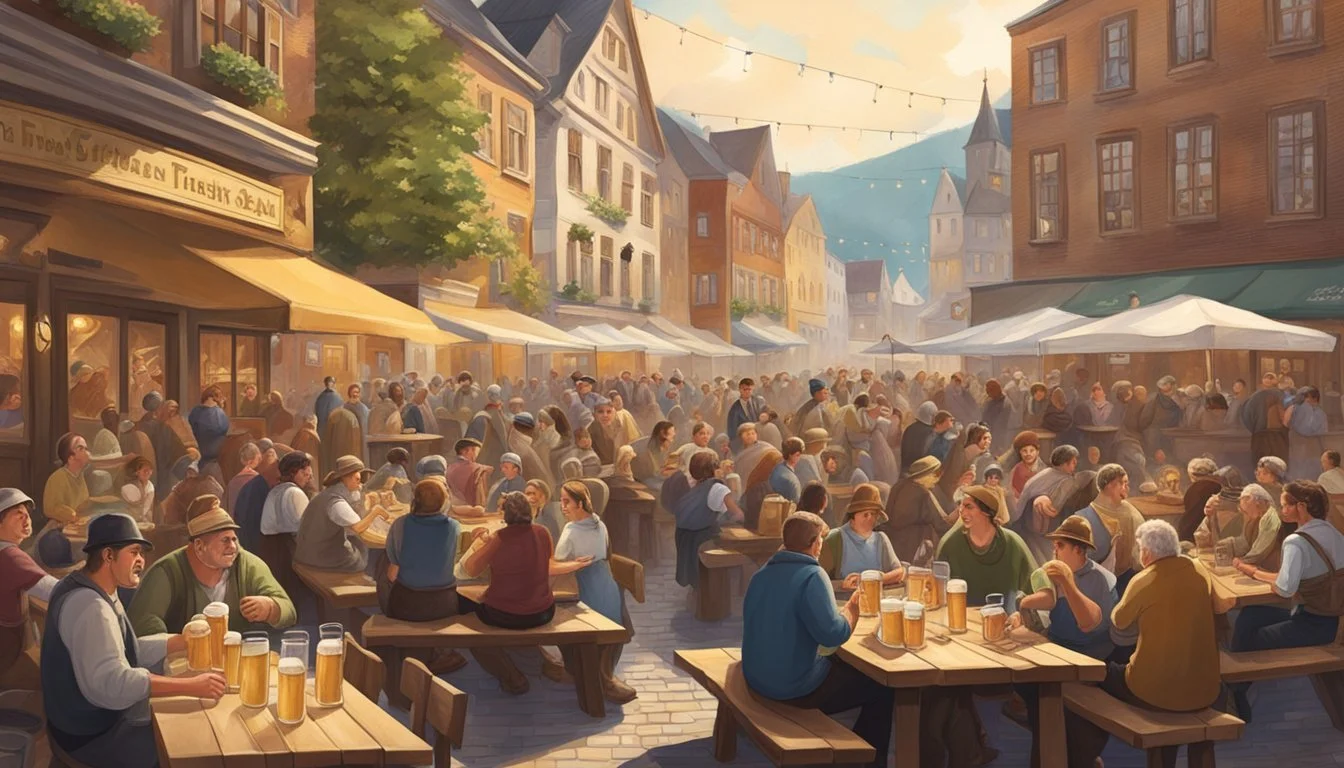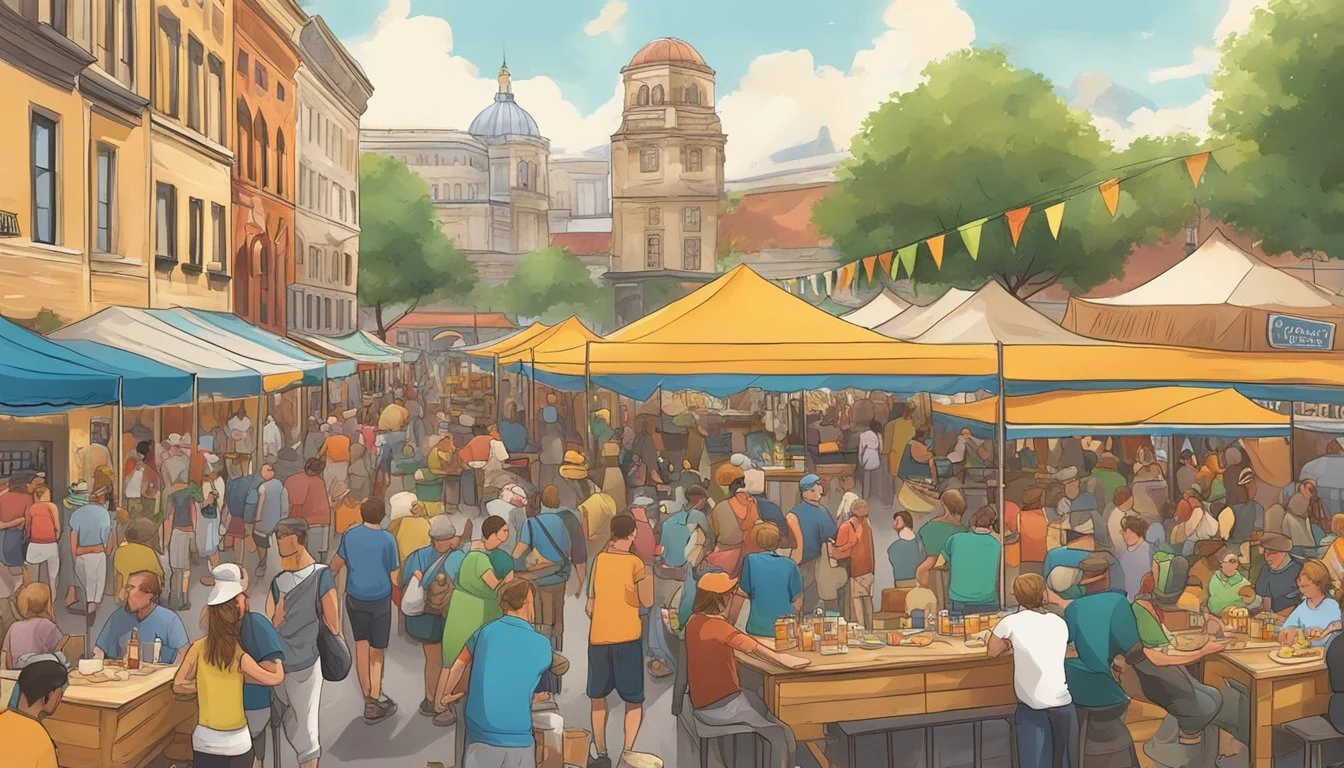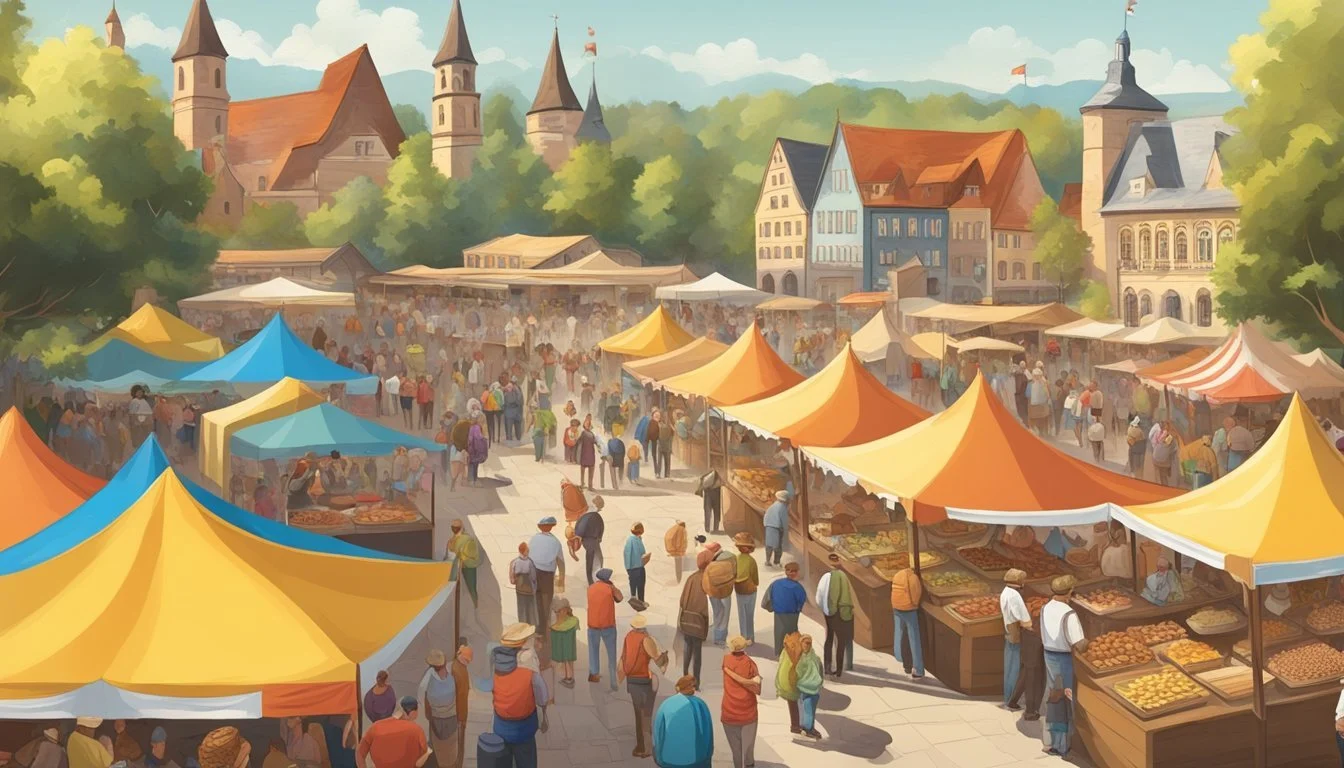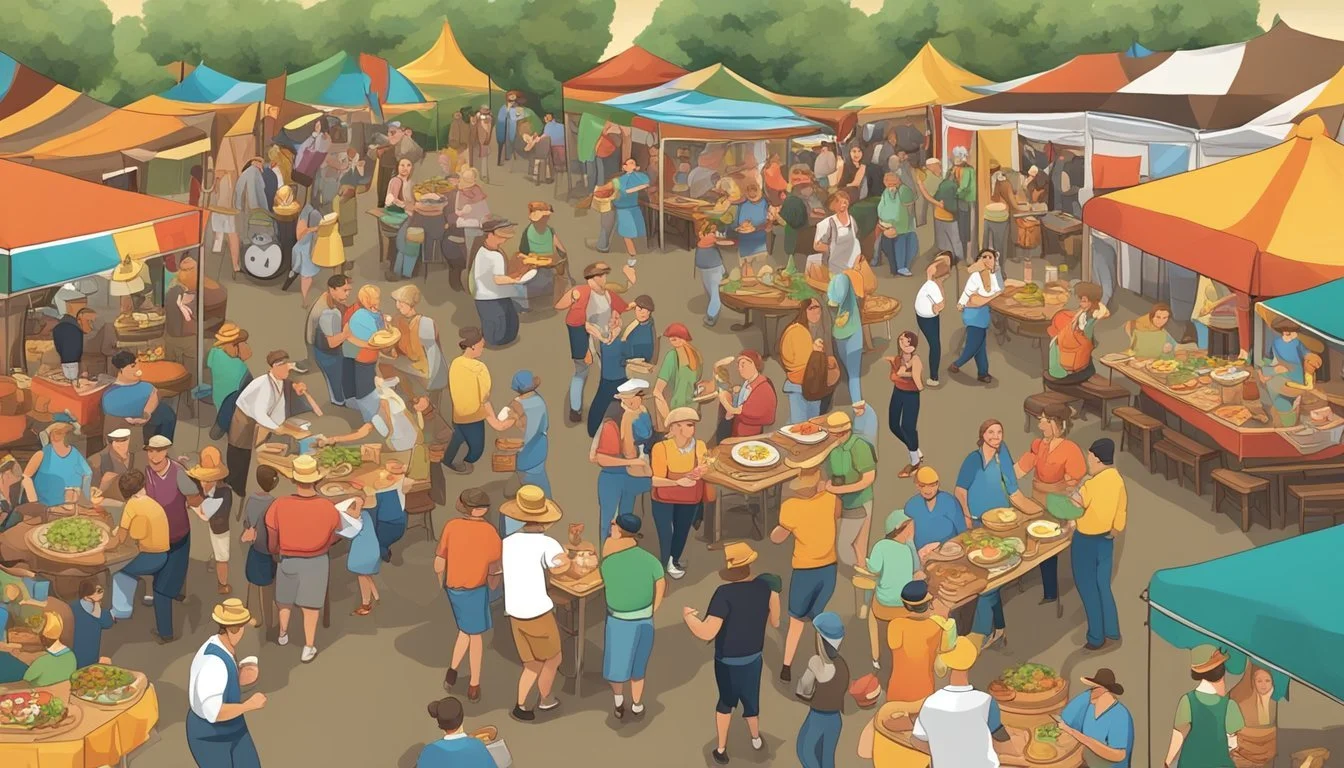German Texan Food and Beer Festivals
A Guide to Cultural Celebrations
Texas is a melting pot of cultures and traditions, and one of the most vibrant influences is that of German heritage. This influence is particularly apparent in the food and beer festivals that pepper the state, celebrating the rich history of German immigrants in Texas. These festivals, often set in towns with strong German roots, offer a taste of the old country with a distinctive Texan twist. They feature an array of authentic German food, from succulent sausages to pretzels, and a variety of beers, alongside traditional music and dances that create a jovial atmosphere of festivity.
Among these celebrations, Oktoberfest stands out as a hallmark event that draws visitors from all over. Towns like Fredericksburg, Muenster, and New Braunfels, to name a few, host annual Oktoberfest events that showcase German-Texan culinary delights and craftsmanship. These festivals not only honor the historical significance of German immigration in the 1830s but also create a space for community bonding and cultural exchange, highlighting the unique fusion of Texan hospitality and German traditions.
The celebrations extend beyond Oktoberfest, with events throughout the year that maintain the German-Texan legacy. Whether it's through the raucous fun of a weenie dog race, the competitive spirit of a stein hoisting competition, or the communal joy of dancing to Oompah music, these festivals provide an immersive experience. They echo the past yet remain dynamic, inviting new generations to explore and appreciate the depth of German influence on Texan culture.
History and Heritage
The strong presence of German influence in Texas has given rise to numerous festivals that celebrate the state's German heritage. These events honor the traditions, food, and beer brought to the area by German migrants in the 19th century.
German Influence in Texas
German settlers began arriving in Texas in the 1830s, bringing with them their customs, language, and traditions. By the mid-19th century, towns such as New Braunfels and Fredericksburg had been founded, creating communities with strong German cultural ties. These settlements maintained aspects of German heritage, including architectural styles, cuisines, and the Texas German dialect. The impact of this heritage is still prominent today, particularly through culinary and festive traditions.
Origins of German Texan Festivals
The Texan appetite for German culture is showcased in longstanding celebrations such as Wurstfest. Usually held in November in New Braunfels, this festival began over half a century ago, thanks to Ed Grist, a veteran meat inspector. Wurstfest set the stage for other events, including the Fredericksburg Oktoberfest, a testament to the enduring legacy of German customs in Texas. These festivals not only celebrate German cuisine, notably sausage and beer but also include music, dance, and traditional games emblematic of German festivities.
German-Texan Heritage Society
Formed to preserve and promote German heritage in Texas, the German-Texan Heritage Society (GTHS) has been instrumental in these efforts. Collaborating with organizations like the Texas State Historical Association, the GTHS provides educational resources and supports events that highlight German-Texan history. The society plays a crucial role in ensuring that the stories and contributions of German immigrants continue to be recognized and celebrated across Texas.
Major Festivals and Events
Texas embraces its German heritage with an array of festivals celebrating German culture, especially notable for food and beer.
Oktoberfest Celebrations
Texas hosts several Oktoberfest celebrations across the state, showcasing German traditions with a Texan twist. Central and North Texas cities including Austin, Fredericksburg, Addison, and Dallas, each hold their distinct Oktoberfest events that include traditional music, food, and, of course, beer. Addison Oktoberfest is renowned for its family-friendly atmosphere and authentic vibes, mirroring the Munich Oktoberfest. Meanwhile, in San Antonio, Oktoberfest gathers crowds for a vivacious celebration of German heritage.
Wurstfest in New Braunfels
New Braunfels, a city with a strong German legacy, is home to Wurstfest—a ten-day festival filled with good food, music, dancing, and carnival rides. Held annually in November, this event is often referred to as a "Texas-sized celebration" of sausage and is a staple event for German-Texan culture enthusiasts.
Maifest and Other Seasonal Festivities
Throughout German Texan communities, Maifest and other seasonal festivals are prominent celebrations that encompass the springtime cheer with parades, polka music, and German folk dances. Fredericksburg and Boerne are well-known for hosting these vibrant, family-friendly events that offer an immersion into German-Texan culture within the picturesque settings of Central Texas.
Christmas and Karneval Markets
In December, German-style Christmas markets spring up in various Texan towns, offering unique crafts, holiday decorations, and warming foods. Towns like Fredericksburg and New Braunfels bring a piece of German Christmas tradition to Texas. Furthermore, the pre-Lenten festivities of Karneval are celebrated in some regions with parades and masquerades, marking the onset of the festive period with a grand display of costumes and revelry.
Culinary Delights and Beverages
German Texan festivals fuse traditional German tastes with the Lone Star State’s hospitality, offering an array of foods and beverages that cater to the palates of both beer aficionados and food lovers. Here, one can savor the rich flavors of German-Texan cuisine and enjoy a variety of local and imported drinks that showcase the best of both cultures.
Traditional German Food
German cuisine is renowned for its hearty flavors, and at these festivals, the food takes center stage. Vendors serve up a range of authentic German food including Schnitzel, thin breaded and fried veal cutlets (What wine goes well with veal cutlets?) often served with a slice of lemon and potato salad. Bratwursts and other sausages are a staple, typically accompanied by sauerkraut and mustard. Pretzels, both soft and hard, provide a salty snack perfect for walking the grounds or sitting in the beer garden. Additional comfort foods such as pork dishes and various smoked meats (What wine goes well with smoked meats?) are also popular, maintaining a traditional culinary thread that ties back to Germany's rich food heritage.
German-Texan Beer and Wine
Beverage selections at these festivals proudly celebrate heritage and quality. Beer gardens pour a myriad of options from classic German pilsners and wheat beers to Texas craft ales that bring a unique local twist to brewing traditions. Patrons can expect to taste a wide variety, including the famed Rauchbier, a distinctive smoked beer hailing from Germany. Besides beer, wineries from the region contribute to the festivities with a selection of German and Texan wines, offering both sweet and dry profiles that cater to different tastes.
Specialty Foods at Festivals
Aside from the traditional fare, festivals often feature specialty foods that blend German and Texan cuisines. Infusing local ingredients and Texan culinary styles, attendees might enjoy dishes like jalapeño-infused sausages or Texan barbeque with a German twist. Desserts are also a cherished part of the food experience with items such as Apfelstrudel—apple strudel—an iconic German dessert which consists of thinly sliced apples, cinnamon, sugar, raisins, and a flaky pastry crust. Local baked goods and desserts such as German Chocolate cake or Texas pecan pies add a sweet finish to the savory journey. These festivals treat visitors to a robust exploration of flavors where cheese, chicken, and even vegetarian options are readily available, ensuring there's something delicious for every attendee.
Cultural Exhibits and Activities
German Texan food and beer festivals are a rich tapestry of heritage where cultural exhibits and activities play a central role in sharing and celebrating Germany's traditions. Visitors can immerse themselves in traditional German music and dance, don vibrant attire and cultural symbols, engage in playful games and activities tailored for children, and appreciate the fine work of artisans and craftsmanship.
Traditional Music and Dance
German Texan festivals resonate with the sound of live German music, from oompah bands to polka. Participants often witness traditional dances such as the Schuhplattler, a Bavarian dance where performers stomp, clap, and strike the soles of their shoes. These festivals usually include dance floors where everyone is encouraged to join in.
Attire and Cultural Symbols
The wearing of Lederhosen and Dirndls, traditional Bavarian garments, is a common sight at these events. Lederhosen are knee-length leather breeches for men, often adorned with intricate embroidery, while the Dirndl is a flared dress worn by women, complete with a bodice, blouse, full skirt, and apron.
Games and Kids' Activities
Festivals cater to family entertainment with a variety of games and kids' activities. Classic German competitions, storytelling, and playful activities are designed to enchant the younger attendees, often drawing upon folklore and Germanic fairy tales for inspiration.
Artisans and Craftsmanship
A highlight of these festivals is the array of artisan vendors displaying their craftsmanship. Handcrafted goods range from cuckoo clocks and Bavarian hats to handmade jewelry. These artisans not only sell their wares but also provide live demonstrations, offering attendees a glimpse into the skills and traditions of their craft.
Festival Locations and Settings
The festivals in German Texan communities fuse traditional German beer and cuisine with the unique culture and setting of the Texas landscape.
Hill Country and the German Belt
In Central Texas, the Hill Country is often associated with spectacular landscapes and a strong German heritage. Places like Fredericksburg, New Braunfels, and Boerne are well-known for their annual German Texan festivals, where one can savor traditional German beers and foods in a setting that feels both distinctively Texan and authentically German. These towns along the German Belt, an area of Central Texas with significant German influences, offer picturesque settings for celebrating this rich cultural fusion.
Fredericksburg: Nestled in the heart of Texas Hill Country, known for its wineries and German heritage.
New Braunfels: Home to Wurstfest, a festival that embraces German culture with a Texas twist.
Boerne: Boasting a charming main street and a vibrant community that values its German roots.
German Heritage Sites
The area surrounding San Antonio and the Austin area, including the Red River Cultural District, is sprinkled with sites of historical significance to the German Texan community. The German Free School in Austin is such a location, offering insight into the historical importance of German culture in the region. These sites often double as venues for cultural festivals that celebrate traditional German customs, complete with beer, food, music, and education on the German language programs once taught at the historical German Free School and other heritage education centers.
San Antonio Area: Hosts a variety of festivals that highlight its German Texan legacy.
Austin Area: Known for the Red River Cultural District, which celebrates diverse heritages including German.
German Free School: Offers a glimpse into the history and preservation of German culture in Texas.
Community and Societal Impact
German-Texan food and beer festivals significantly influence local communities by fostering cultural education, bolstering economies through tourism, and preserving the German-Texan heritage.
Educational and Linguistic Contributions
German-Texan heritage societies and festivals often provide educational opportunities that aim to deepen understanding of the state's cultural history. They offer insight into the Texas German dialect, which is a unique amalgamation of English and 19th-century German. Initiatives like the German-Texan Heritage Society often take it upon themselves to offer classes and programs to both adults and children, focusing on language skills and historical knowledge. In addition, entities like the Goethe-Institut work to promote the German language through their community presence and membership outreach.
Economic Effects and Tourism
Annually, German-Texan festivals, such as Wurstfest in New Braunfels, attract over 100,000 visitors, providing a substantial boost to local economies. The influx of tourists supports businesses and increases revenues, not only for the festival itself but for hospitality and related sectors.
Direct economic impacts include:
Increased occupancy in hotels and inns
Higher demand in local restaurants and bars
The creation of seasonal jobs
Community and Cultural Preservation
The celebration of German-Texan culture goes beyond mere entertainment; it's a vital method of community and cultural preservation. Events like Oktoberfest and Wurstfest serve as gathering points where traditions like music, dance, food, and beer are not only enjoyed but also passed down to successive generations. The German Free School has historical importance as an educational establishment that continues to play a part in preserving the cultural fabric of the region, while the German-Texan Heritage Society sees its membership play a custodial role in maintaining these traditions.
Contemporary Challenges and Adaptations
As German Texan festivals evolve, they confront distinct challenges and undergo adaptations, especially in light of recent public health concerns and technological changes.
Covid-19 Effects on Festivals
The pandemic forced many festivals, including significant events like Wurstfest, to either cancel, postpone, or adapt their festivities. Organizers implemented socially distanced protocols to ensure safety. Despite this, many festivals saw a substantial reduction in attendance, impacting the cultural celebration and economic benefits typically associated with these events.
Technological Advancements and Social Media
Advancements in technology and the role of social media have provided new avenues for festival promotion and engagement. They offer virtual experiences and digital platforms where attendees can have a taste of the festival atmosphere from afar. Social media campaigns harness the power to reach a larger audience, sparking increased interest and participation in German Texan traditions.
Future of German Texan Festivities
The future of German Texan festivities is being carefully shaped to balance tradition with innovation. Organizers are developing strategies to enhance the festival experience while preserving the essence of German Texan heritage. This includes incorporating hybrid models blending in-person elements with digital accessibility, opening up potential for broader, more diverse participation.







